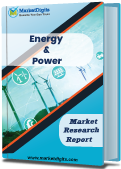- Home
- Energy & Power
-
Sustainable Aviation Fuel Market

Sustainable Aviation Fuel Market By Fuel Type (Biofuel, Hydrogen Fuel, Power-to-Liquid, Gas-to-Liquid), Feedstock (Biomass-Based Feedstock, Waste-Based Feedstock, Algae-Based Feedstock), Manufacturing Technology, Blending Capacity (Below 30%, 30% to 50%, Above 50%), End-user & Region - Partner & Customer Ecosystem (Product Services, Proposition & Key Features) Competitive Index & Regional Footprints by MarketDigits - Forecast 2024-2032
Industry : Energy & Power | Pages : 176 Pages | Published On : Mar 2024
The Global Sustainable Aviation Fuel (SAF) Market stands at the forefront of transformative changes in the aviation industry, driven by a collective commitment to reducing carbon emissions and transitioning towards sustainable aviation practices. This executive summary provides a comprehensive overview of the market, offering key insights into its current state and future potential, encompassing market drivers, challenges, opportunities, dominating segments, regions, countries, and key players. As the aviation sector seeks to address its environmental footprint, SAF emerges as a critical solution, poised to revolutionize air travel by offering a greener alternative to traditional aviation fuels.
The Global Sustainable Aviation Fuel Market is defined by the production and utilization of aviation fuels derived from renewable and low[1]carbon sources. The market caters to the aviation industry's need for a sustainable and environmentally responsible fuel source, aligning with global efforts to reduce greenhouse gas emissions and combat climate change. Sustainable aviation fuels, produced from feedstocks such as biomass, waste oils, and synthetic processes, offer a viable pathway to lower the carbon intensity of aviation operations.
Major Players In Sustainable Aviation Fuel Market Include: Neste Corporation, Gevo Inc., Honeywell UOP, World Energy, Fulcrum BioEnergy, Red Rock Biofuels, TotalEnergies, Velocys, LanzaTech, SkyNRG, AltAir Fuels, Amyris, SG Preston, REG Synthetic Fuels.
The primary drivers powering the Global Sustainable Aviation Fuel Market are the imperative to reduce aviation's carbon footprint and the growing awareness of environmental sustainability. Stricter emissions regulations, such as those outlined by the International Air Transport Association (IATA) and governmental bodies, are compelling the aviation sector to adopt sustainable alternatives. Additionally, consumers' increasing preference for eco-friendly travel options is prompting airlines to invest in SAF. Furthermore, advancements in feedstock technologies, refining processes, and commercial-scale production facilities are driving down the cost of SAF, enhancing its competitiveness in the aviation fuel market.
Despite its promise, the Global Sustainable Aviation Fuel Market faces significant challenges. High production costs, limited feedstock availability, and the need for substantial infrastructure investments for SAF production facilities pose hurdles to market expansion. Additionally, scaling up SAF production to meet the aviation industry's vast demand remains a formidable challenge. Ensuring feedstock sustainability and securing long-term supply agreements are also critical challenges. The market must navigate regulatory complexities and ensure global harmonization of SAF standards to foster widespread adoption and address concerns regarding fuel compatibility with existing aircraft.
The market presents substantial opportunities, driven by an increasing number of airlines committing to carbon-neutral or net-zero emissions by mid-century. Partnerships between aviation stakeholders, feedstock producers, and technology companies are forming to bolster SAF production and distribution. With governments’ worldwide providing incentives and supportive policies for SAF development, innovation in feedstock sourcing, advanced conversion processes, and carbon capture technologies are emerging. The burgeoning demand for sustainable air travel offers vast potential for growth, encouraging investments in SAF production facilities and expanding its availability in aviation supply chains.
In the Global Sustainable Aviation Fuel Market, the bio-based SAF segment, derived from feedstocks such as agricultural residues and waste oils, dominates due to its established production processes and relatively lower carbon footprint. In terms of regions, North America, led by the United States and Canada, is at the forefront, with Europe following closely. These regions are spearheading SAF production and adoption, fueled by strong environmental regulations and a commitment to sustainable aviation practices.
Key players shaping the Global Sustainable Aviation Fuel Market include prominent energy and aviation companies such as Neste, Gevo, Inc., and World Energy. These industry leaders are actively investing in expanding production capacity, collaborating with airlines, and supporting the development of advanced feedstock technologies to meet the aviation sector's growing demand for SAF. Their global presence, technological prowess, and sustainability commitments position them as leaders in driving the adoption and innovation of sustainable aviation fuels.
The Global Sustainable Aviation Fuel Market emerges as a beacon of hope in the aviation industry's quest for sustainability. As the world grapples with the challenges of climate change and environmental stewardship, SAF offers a viable pathway to reduce aviation's carbon footprint significantly. With its rapid growth trajectory, the market stands poised to play a pivotal role in reshaping the future of aviation, where sustainable air travel becomes the norm. As airlines and governments commit to greener skies, the Global SAF Market offers not only environmental benefits but also economic opportunities and the promise of a more sustainable aviation industry.
Major Classifications are as follows:
By Fuel Type
- Biofuel
- Hydrogen Fuel
- Power-to-Liquid
- Gas-to-Liquid
By Feedstock
- Biomass-Based Feedstock
- Waste-Based Feedstock
- Algae-Based Feedstock
- Others
By Manufacturing Technology
- Fischer-Tropsch (FT)
- Hydroprocessed Esters and Fatty Acids (HEFA)
- Synthesized Iso-Paraffins (SIP)
- Alcohol-to-Jet (ATJ)
- Catalytic Hydrothermolysis (CHJ)
- Hydroprocessed Hydrocarbons, Esters and Fatty Acids (HC-HEFA)
- Others
By Blending Capacity
- Below 30%
- 30% to 50%
- Above 50%
By End-user
- Commercial Aviation
- Military Aviation
- Business and General Aviation
By Region
- North America
- US
- Canada
- Latin America
- Brazil
- Mexico
- Argentina
- Rest of Latin America
- Europe
- UK
- Germany
- France
- Italy
- Spain
- Russia
- Rest of Europe
- Asia Pacific
- China
- Japan
- India
- South Korea
- Rest of Asia Pacific
- Rest of the World
- Middle East
- UAE
- Saudi Arabia
- Israel
- Rest of the Middle East
- Africa
- South Africa
- Rest of the Middle East & Africa
- Middle East
Reason to purchase this Sustainable Aviation Fuel Market Report:
- Determine prospective investment areas based on a detailed trend analysis of the global Sustainable Aviation Fuel Market over the next years.
- Gain an in-depth understanding of the underlying factors driving demand for different Sustainable Aviation Fuel Market segments in the top spending countries across the world and identify the opportunities each offers.
- Strengthen your understanding of the market in terms of demand drivers, industry trends, and the latest technological developments, among others.
- Identify the major channels that are driving the global Sustainable Aviation Fuel Market, providing a clear picture of future opportunities that can be tapped, resulting in revenue expansion.
- Channelize resources by focusing on the ongoing programs that are being undertaken by the different countries within the global Sustainable Aviation Fuel Market.
- Make correct business decisions based on a thorough analysis of the total competitive landscape of the sector with detailed profiles of the top Sustainable Aviation Fuel Market providers worldwide, including information about their products, alliances, recent contract wins, and financial analysis wherever available.
TOC
Table and Figures
Methodology:
At MarketDigits, we take immense pride in our 360° Research Methodology, which serves as the cornerstone of our research process. It represents a rigorous and comprehensive approach that goes beyond traditional methods to provide a holistic understanding of industry dynamics.
This methodology is built upon the integration of all seven research methodologies developed by MarketDigits, a renowned global research and consulting firm. By leveraging the collective strength of these methodologies, we are able to deliver a 360° view of the challenges, trends, and issues impacting your industry.
The first step of our 360° Research Methodology™ involves conducting extensive primary research, which involves gathering first-hand information through interviews, surveys, and interactions with industry experts, key stakeholders, and market participants. This approach enables us to gather valuable insights and perspectives directly from the source.
Secondary research is another crucial component of our methodology. It involves a deep dive into various data sources, including industry reports, market databases, scholarly articles, and regulatory documents. This helps us gather a wide range of information, validate findings, and provide a comprehensive understanding of the industry landscape.
Furthermore, our methodology incorporates technology-based research techniques, such as data mining, text analytics, and predictive modelling, to uncover hidden patterns, correlations, and trends within the data. This data-driven approach enhances the accuracy and reliability of our analysis, enabling us to make informed and actionable recommendations.
In addition, our analysts bring their industry expertise and domain knowledge to bear on the research process. Their deep understanding of market dynamics, emerging trends, and future prospects allows for insightful interpretation of the data and identification of strategic opportunities.
To ensure the highest level of quality and reliability, our research process undergoes rigorous validation and verification. This includes cross-referencing and triangulation of data from multiple sources, as well as peer reviews and expert consultations.
The result of our 360° Research Methodology is a comprehensive and robust research report that empowers you to make well-informed business decisions. It provides a panoramic view of the industry landscape, helping you navigate challenges, seize opportunities, and stay ahead of the competition.
In summary, our 360° Research Methodology is designed to provide you with a deep understanding of your industry by integrating various research techniques, industry expertise, and data-driven analysis. It ensures that every business decision you make is based on a well-triangulated and comprehensive research experience.
• Product Planning Strategy
• New Product Stratergy
• Expanded Research Scope
• Comprehensive Research
• Strategic Consulting
• Provocative and pragmatic
• Accelerate Revenue & Growth
• Evaluate the competitive landscape
• Optimize your partner network
• Analyzing industries
• Mapping trends
• Strategizing growth
• Implementing plans
Covered Key Topics
Growth Opportunities
Market Growth Drivers
Leading Market Players
Company Market Share
Market Size and Growth Rate
Market Trend and Technological
Research Assistance
We will be happy to help you find what you need. Please call us or write to us:
+1 510-730-3200 (USA Number)
Email: sales@marketdigits.com







